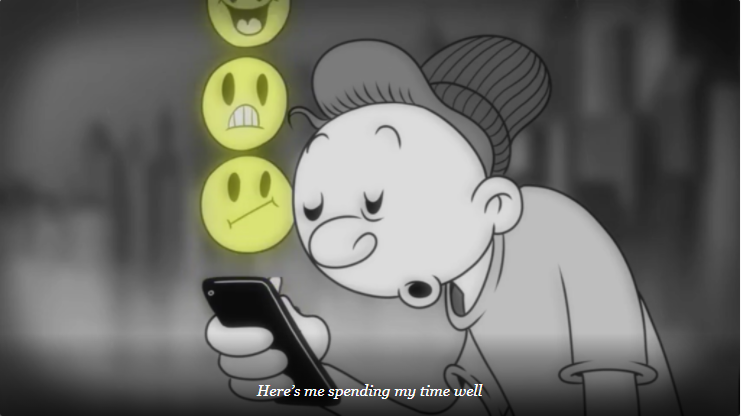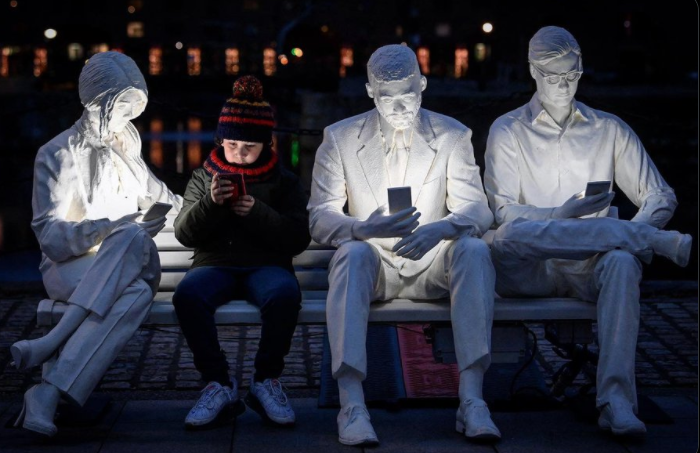Are We All Addicted?
We all know the feeling: You’ve been vegged out in social media land for an hour, just rotting into the couch, when you finally look up, only to realize that you just wasted an entire hour of your life and now you feel physically sick and mentally drained and really want to take a nap.
Digital addiction is a real phenomenon. Everyone has their phone as their constant pocket companion. Studies on cell phone addiction show that around 66% to 75% of people are addicted to their phones. I am no different. I got my smartphone in December of 2018 during my first semester at Lake Area Tech. I was a flip phone guy in high school and felt some disdain towards my friends, who all were very endeared to their phones. I felt that since I was a few years older than they were when they got their phones, I would have more self control and wouldn’t succumb to the intoxicant that was my smartphone. I was very wrong to feel that way.
Within days I was watching YouTube for hours and mindlessly going back and forth between Snapchat, Instagram and Facebook; which is not out of the norm by any means. It was an extreme distraction and didn’t help me one bit with the difficult process of getting through college courses.
Life continued on in this way, with me occasionally making half-hearted attempts to use my phone less, until I moved back to Watertown for my post-graduation internship in June of 2020.

Living on my own for the first time, I realized that sitting on my phone for hours in an empty house drained all of the vitality from my soul. I loathed this feeling. The feeling of helplessly being sucked into another 20 minute block of absolute time waste.
I started looking into the terrible ways that constant exposure to screens can change our brains and how we view the world; how unnatural and superficial and manipulating social media can be. I felt a real sense of urgency. I made a concerted effort that I was going to change my phone habits drastically.
“I loathed this feeling. The feeling of helplessly being sucked into another 20 minute block of absolute time waste.”
I had to make this lifestyle change a focal point of my life, otherwise it wouldn’t stick. I had tried the app timers but I would end up changing the time allowed. I had tried just deleting social media for a few days, but when I reintroduced it the problems would ramp right back up again. A large change was necessary, I had to change my attitude towards my phone. There were some steps I needed to take to curb my phone use:
Conquer the Compulsion
First, I deleted all social media and superfluous apps off of my phone. I probably got rid of 20 to 30 apps. The reason for this is that the second I opened my phone, I was instantly mobbed by a screen full of all these colorful apps that were vying for my attention. And there’s a dopamine hit in each one of those. So, I decluttered my home screen, which made opening the phone a less bewildering experience. The beautiful thing about this part is that I’ve added only 2 or 3 of those apps back onto my phone, almost a full year later. Most of them were completely useless.
I also made sure to tell those closest to me that I was getting off social media. There wasn’t any negative reaction. Most people are encouraging of that it seems, probably because they realize that their own social media use is a problem.
Then, I had to make it a habit to not randomly check my phone for notifications. That was one of the hardest ones, because at this point, we’re all hardwired to check our phones throughout the day whenever there’s a lull in the action. I would still find myself unconsciously picking it up, but getting rid of all the social medias and apps helped. I only got a fraction of the notifications after that, and it taught my brain that you aren’t going to get a shot of happy every time you check it because there’s a very small chance that there’s anything there.
I would leave my phone at the house for long periods and go for walks, get groceries or go workout. I lived alone so this may not be suitable for everybody. Find a part of your day where you can leave your phone at the house and go.
“I started actually TRYING new things… I also strengthened my spiritual life. Without so many interruptions, it was much easier to pray … It brought a real peace of mind that I haven’t felt since.”
Unfiltered Living
I started actually TRYING new things. I tried my hand at painting, doing breathing exercises, I learned how to sew, I started disc golfing, and went camping. I got back into writing and reading more, I would get absorbed in playing guitar and creating music as I used to in high school, before I had a smartphone. I would get into awesome conversations with strangers just because I was actually in the real world, and wouldn’t let myself revert to phone-face mode because I was in a new or uncomfortable situation. I also strengthened my spiritual life. Without so many interruptions, it was much easier to pray and simply sit with my thoughts in contemplation. It brought a real peace of mind that I haven’t felt since.
A newfound love for nature was what really took hold of me throughout this period. When I would go on my walks to the parks in town, I was totally enveloped in the natural world around me. I began to notice and really appreciate the detail that God put into creation. The particularity of this leaf compared to that leaf, the tiny details of a little bug on a tree, the stillness of sitting in the grass with no one around, and the calming effects of the woods around me. I felt as though I lived in a poem.
Over time, I started noticing my perception of phones changing.
On a bright Sunday morning In September, I visited Sioux Falls Park. I was taking in the sound of the falls and the rocks and all that. I had left my phone in the car, for the purpose of really enjoying the scenery. Looking up from the water, I felt as if everyone around me was in a simulation. I’m sure you’ve noticed this as well in your own life. All the people were either taking selfies, taking pictures for other groups, or looking down at their phones tapping away. I (ashamedly) felt disgusted and very self-righteous. All these people were merely using the setting for a photo-op instead of being there to see the beauty and feel the power of the Falls. I, on the other hand, was there to truly experience it. There was one older gentleman I spotted who had his hands on the railing, looking out at the water with a contented look on his face. Good for that guy.
“On a bright Sunday morning in September, I visited Sioux Falls Park. I was taking in the sound of the falls and the rocks and all that… Looking up from the water, I felt as if everyone around me was in a simulation… All the people were either taking selfies, taking pictures for other groups, or looking down at their phones tapping away”
I used the word ashamedly earlier because I realized that on countless occasions I had been just like everyone else at the Falls, and probably would be again. Phones are going to be utilized to capture a moment and there’s nothing wrong with that, but there’s more to consider: You may be really in the moment and enjoying yourself, catching a few shots here and there for memory’s sake; or you’re snapping all the pictures you can, only to throw them up for your followers in social media land.
Another instance: One day, a few weeks after putting these practices in place, I got home from work and was not sure what to do next, so I sat down and started scrolling my Google news feed. I did this for approximately one minute before realizing with horror what I was doing. My thought process was something like, “I’m surprised that this feels as bad as it does, I’m really betraying myself and wasting my time right now. I can’t do this anymore.” I had such a visceral reaction because up until then, I had been so deliberate with how I spent my time, that this minute wasted was truly a betrayal! There was much more that I could be doing.
Those two points illustrate how my attitude towards my phone had changed and that phone usage had become a focal point for me. It would be difficult to fall back into its clutches as easily.

Full-Scale Phone Offensive
For the month of October, 2020, I culminated my efforts into a full-scale offensive on my phone dependence, a phone fast, let’s say. Not entirely necessary, but it was a test. Mostly a test to help my spiritual life strengthen and grow.
I eliminated even more phone habits. No social media was a no-brainer, and easy for me at that point. But I also loved watching philosophical or motivational videos on YouTube, and I listened to podcasts when I would cook or do chores as well. I cut both those out entirely. (Reason being that I sometimes found myself agitatedly looking for something to listen to on YouTube before I would do the dishes or even take a shower, which I didn’t like.) I only allowed myself to listen to sermons. Contemporary music was also cut out, I only listened to classical music during certain parts of the day. I had a few friends that I would still consistently text, so I let them know what the plan was, why I was doing it and that I wouldn’t be texting them at all that month, just an occasional phone call. They were all understanding.
This was about as close as I’ve gotten to basically shutting the phone up in a safe and acting like it didn’t exist. It really did help me focus more on prayer, my work and enjoying basic tasks such as doing the dishes and taking a shower. I could put my attention fully towards one thing and not have the nagging feeling of needing to check my phone, or anxiously waiting for the notification ding. It was freeing to take the phone out of the question and not even have to think about it.
Now, how could someone apply some of these practices (Getting rid of social media, deleting all your apps, leaving your phone at home or taking a phone fast) without having a panic attack? Because that does happen to some people when they go phone free. The sudden lack of instant stimulation can bring about a vague sense of anxiety and dread.

What Do I Do With All This Time?
If you’re going to try this, the most important thing is to have a plan for how you’re going to spend your day. Now the phone is out of the picture, and all of a sudden you have all this time! What do you do with it? Is there a woodworking project that’s been on the backburner? A love for drawing that you haven’t been nurturing since you were a kid? If you don’t fill the time with productivity, it is going to be very jarring and uncomfortable. Granted, it will undoubtedly be uncomfortable for a bit, because your brain’s neural pathways are so jacked up, but if you have some different hobbies or ideas you want to work on, it will make the transition a lot smoother.
Now, there’s a caveat that I will insert here: This was my first experience living on my own, and it was truly a period of discovery about myself. I got a grasp on what I really enjoyed doing and actually started implementing some crucial changes to my behavior. I also had lots of downtime to do whatever I wanted and had no extra burdens besides what I chose to take on. I didn’t live with anyone so I didn’t have to deal with anyone else’s particularities and their relying on me. It was truly the best environment for me to try this phone experiment.
That doesn’t mean that it won’t have immense benefits for your life. Having a single-minded approach to a task with no diversions; the quiet calmness of actually being bored and not anxiously rushing to fill it with an app; the high of having a great conversation with a total stranger somewhere; or the unconsciousness of being in the zone, totally immersed in an activity you love doing. Something where you don’t even know how much time has passed. Something that truly gives you a deep sense of meaning in your life.
I’ve been slipping up recently. I haven’t been as disciplined with my phone, and I can feel the negative consequences. Lack of focus, purpose and execution to name a few. Thinking back on how I used to make use of my phone compared to how I am currently using it has been a wake-up call. Hopefully it’ll help me get back on the path.
Phones can be a great tool for us. Sadly, they have taken over our personal lives and are in fact, dictating how we live. If you don’t like what you’re seeing with the people close to you, and how they use their phone, then you can start by fixing how you utilize your phone. You can be an example for someone else and maybe lead to them changing their behavior. Thus we can begin a healthier relationship with our pocket companions, and ultimately become a healthier people.
I highly recommend listening to The Art of Manliness Podcast with guest Cal Newport. Most of what I implemented came from Cal. He realized a while ago all the weird, terrible effects that the constant exposure to social media has on our brains. How it shortens our attention span, kills original and creative thought, and ruins relationships with people close to us. He advocates for digital minimalism. He’s not recommending a ban on digital devices, only a more concentrated and purposeful approach to using our devices in a truly helpful way, without all the negative impacts.






3 Responses
Love the article! Totally relate, too. One thing I noticed about my internet addiction (mine encompassed my phone and laptop) was how it affected me not only during the hours on the couch but after I finally turned it off too. It filled my mind with distractions and numbed it, shutting off so many opportunities for spiritual thoughts and inspirations. Someone once said that God speaks in whispers, so we have to be quiet to hear Him. Then I decided to cut out those things that stood between me and God. It was an extremely long and difficult process, but nothing is impossible with the grace of God. I’m still not perfect, but the freedom that came was well worth it. To all those out there who are on that journey or haven’t yet begun, don’t let anything stop you! No matter how hard it is, you can do it with the grace of God. The health, happiness, and holiness that comes from phone freedom is well worth the struggle!
Thanks for the comment! The difference is remarkable once you cut out all the social media and news (and most contemporary music, which I know isn’t as popular of an opinion). So many young people don’t have any idea what a life without constant sensory overload is like. It’s terrible. Hopefully more people start to realize the peace to be found without the distractions.
I was just talking to one of my older sons this evening I’m just such a subject and came across this article that was written. It was like reading about myself and it was a great encouragement! And with prayer determination and the grace of God I’m going to follow through and not spend time on my phone only for answering the phone. Thanks for the article!